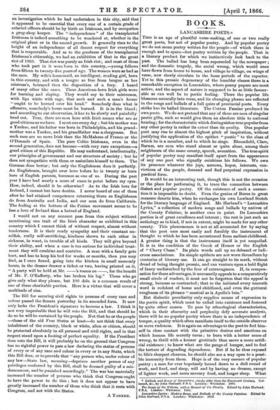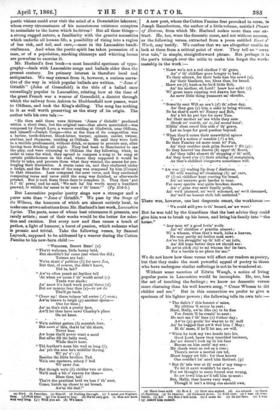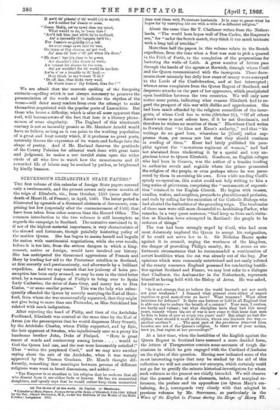BOOKS.
LANCASHIRE POETS.*
This is an age of plentiful verse-making, of one or two really great poets, but not of popular poetry. And by popular poetry we do not mean poetry written for the people—of which there is enough and to spare—but poetry written by the people. That is a literary product for which we instinctively look back to the past. The ballad has long been superseded by the newspaper ; and the domestic tragedy, the social wrong, which would once have flown from house to house, and village to village, on wings of verse, now slowly circulate in the loose periods of the reporter. Yet to this prosaic degeneracy of the humbler classes there is a remarkable exception in Lancashire, where penny papers are most active, and the aspect of nature is supposed to be as little favour- able as can well be to poetic feeling. There the popular life blossoms naturally into verse, and its changing phases are reflected in the songs and ballads of a full quire of provincial poets. Every strike has its ballad literature. The Cotton Famine produced its own poets. We do not pretend that any of these are men of singular poetic gifts, such as would give them an absolute title to national hearing; for the characteristic which distinguishes true popular from any other poetry is rather its extent than its quality. One popular poet may rise to almost the highest pitch of inspiration, without justifying the application of the epithet " poetic " to the class of which he is a member, and to which he sings. Bloomfield, Clare, Barnes, are men who stand almost or quite alone, among their neighbours of the same county, speech, avocation. The true spirit of popular poetry may manifest itself apart from the appearance of any one poet who signally outshines his fellows. We own its presence wherever the joys, sorrows, hopes, interests, con- victions of the people, demand and find perpetual expression in poetical form.
It would be an interesting task, though this is not the occasion or the place for performing it, to trace the connection between dialect and popular poetry. Of the existence of such a connec- tion it is impossible to doubt. Even the genius of Burns in great measure deserts him, when he exchanges his own Lowland Scotch for the literary language of England. Mr. Harland's "Lancashire Lyrics," a collection of modern songs and ballads by natives of the County Palatine, is another case in point. Its Lancashire portion is of great excellence and interest ; the rest is just such an anthology as in kind, if not in extent, might be made for any other county. This phenomenon is not at all accounted for by saying that the poet uses most easily and forcibly the instrument of thought to which he has been accustomed from earliest childhood. A greater thing is that the instrument itself is yet unspoiled. It is in the condition of the Greek of Homer or the English of "Chevy Chase." Its plain words call up no debased or ludi- crous associations. Its simple epithets are not worn threadbare by centuries of literary use. It can go straight to its mark, without dread of being thought prosaic, and can venture upon a bold flight of fancy undisturbed by the fear of extravagance. If, in compen- sation for these advantages, it necessarily appeals to a comparatively small circle of readers, it must not be forgotten that the appeal is strong, because so contracted ; that to the initiated every uncouth word is redolent of home and childhood, and even the guttural roughness of its phrases "musical as is Apollo's lute."
But dialectic peculiarity only supplies means of expression to the poetic spirit, which must be called into existence and fostered by quite other causes. To pass by ethnological characteristics, which in their obscurity and perplexity defy accurate analysis, there will be no popular poetry where there is no independence of temper, a quality which often manifests itself to the outside observer as mere rudeness. It is again an advantage to the poet to feel him- self in close contact with the primitive desires and emotions on which human life secretly turns ; to burn with a hotter sense of wrong, to thrill with a keener gratitude than move a more artifi- cial existence ; to know what are the pangs of hunger, and to feel the torture of degrading dependence. But if he be thus exposed to life's sharpest chances, he should also see a way open to a possi- ble immunity from them. Hope is of the very essence of popular poetry ; a man for ever hopelessly bound down to a dull round of work, and food, and sleep, will end by having no dreams, except of lighter work, and more savoury food, and longer sleep. What
• Ballads and Songs of Lancashire, chiefly older than the Nineteenth Century, Col- lected, .ha., by John Harland, F.S.A. London: Whittaker. 1865.
The Songs of the Wilsons, with a Mentoir of the Family. Edited by John Harland, F.S.A. London : Whittaker. 1865.
Lancashire Lyrics : Modern Songs and Ballads of the County Palatine. Edited by John Harland, F.S.A. London: Whittaker. 1865. poetic visions could ever visit the mind of a Dorsetshire labourer, whom every circumstance of his monotonous existence conspires to assimilate to the horse which he drives? But all these things — a strong rugged nature, a familiarity with the granite necessities which underlie all human life, a possibility of rising into a region of less risk, and toil, and care,—meet in the Lancashire handi- craftsman. And when the poetic spirit has taken possession of a man, or of a population, smoking chimneys and whirring looms are powerless to exorcise it.
Mr. Harland's first book—a most beautiful specimen of typo- graphy—deals with Lancashire songs and ballads older than the present century. Its primary interest is therefore local and antiquarian. We may extract from it, however, a curious narra- tive of the way in which popular ballads are written. " Jone o' Grinfilt " (John of Greenfield) is the title of a ballad once exceedingly popular in Lancashire, relating how at the time of the great French war a weaver of G-reenfield, a district through which the railway from Ashton to Huddersfield now passes, went to Oldham, and took the King's shilling. The song has nothing in it as well worth preserving as the story of its origin. The author tells his own tale :-
"He then said there were thirteen 'Jones o' Grinfilt ' produced within a short time, but the original one—that above mentioned—was composed by Joseph Lees, a weaver residing at Glodwick, near Oldham, and himself—Joseph Coupe—who at the time of its composition was a barber, tooth-drawer, blood-letter, warper, spinner, carder, twine; stubber, and rhymster, residing at Oldham. He said they were both in a terrible predicament, without drink, or money to procure any, after having been drinking all night. They had been to Manchester to see the play, and were returning to Oldham the day following, when, in order to raise the wind, they agreed to compose a song to be sung at certain public-houses on the road, where they supposed it would be likely to take' and procure them what they wanted, the means for pro- longing their dissipation. A storm came on, and they sheltered under a hedge, and the first verse of the song was composed by him (Coupe) in that situation- Lees composed the next verse, and they continued composing verse and verse until the song was finished, as afterwards printed. But it took them three days to complete it. They then put it i' th' press,' and he said, We met ha' bin worth mony a hunthert peawnd, iv widdin ha' sense to ta' care o' th' brass." (Pp. 214-5.) But Lancashire popular -poetry sings now a stronger and a purer note than " Jone o' Grinfilt." We pass by the Songs of the Wilsons, the humours of which are almost entirely local, to make one ortwo selections from Mr. Harland's last work, Lancashire Lyrics. The poets, some of whose best utterances it presents, are rarely artists ; most of their works would be the better for selec- tion and excision. But every now and then comes a touch of pathos, a light of humour, a burst of passion, which redeems what is prosaic and trivial. Take the following verses, by Samuel Laycoek, supposed to be addressed by a weaver during the Cotton Famine to his new-born child :— "WELooms, BONNY Bum! (a)
" Tha'rt welcome, little bonny brid, But shouldn't ha' come just when tha did; Toimes are bad:
We're short o' pobbies (b) for eawr Joe,
But that, of course, tha didn't know, Did ta, lad?
" Aw've often yeard ml feyther tell 'At when aw coom th' world misel (c) Trade wur slack:
An' maw it's hard work pooin' throo (d) But aw munno fear thee (e)—iv aw do Thall go back.
"Cheer up! these toimes 'ull awter (f) Boon; Aw'm beawn to beigh (g) another spoon— One for thee ;
An' as tha's sich a pratty face, Aw'll let thee have eawr Charley's place On ml knee.
(a) Bird. (5) Porridge. (c) Myself. (d) Pulling through. (e) I must not frighten thee. (f)Will alter. (g) I'm bound to buy. (PO We've only got, 0) lies not been wed very long. (I) With you all. (k) We hay% " We'n nobbut getten (h) coarsish fare,
But eawt o' this, tha'st ha' thi share, Never fear.
Aw hope tha'll never want a meel But allus fill thi bally weel, While tha'rt here.
" Thi feyther's noan bin wed so long (i), An' yet tha sees he's middlin' throng
Wi' yo' o': (j)
Besides thi little brother, Ted, We'n one upsteers, asleep V bed Wi' eawr Joe.
"But though we'n (k) childer two or three, - We'll mak a bit o reawm for thee—
Bless thee, lad!
Tha'rt the prattiest brid we han th' nest, Come, hatch up closer to ml breast, Aw'm thi dad!"
A new poet, whom the Cotton Famine first provoked to verse, is Joseph Ramsbottom, the author of a little volume, entitled Phases of Distress, from which Mr. Harland makes more than one ex-
tract. He, too, woos the domestic muse, and not without success,
as the following verses, extracted from a poem entitled Eawt o' Work, may testify. We confess that we are altogether unable to.
look at them from a critical point of view. They tell an " owre true tale," in simple, straightforward phrase. But perhaps it in the poet's triumph over the critic to make him forget the work- manship in the work :—
" Neaw we'n not a red eindher th' grate, An' o' th' childher gone hongry to bed ; To their sthraw, for their beds han bin sowd (a), An' their blankets, too, bless thee, for bread. Heaw aw (6) hush-a-be-bo'd little Bob, An' his mother, eh Lord! heaw hoo soikt (c) Wi' great tears running wot deawn her face, As eawr little thing yammert an' skroikt.
" Some'dy sent Will an arn't (d) th' other day, An' they gan (e) him a cake to bring whoam, So he shar'd eawt vi' Nanny and Bob, An' a bit he put bye for eawr Tom. An' their mother an' me while they eete Stoode an' watcht, an' so fed second hond Niblin' close enoof this side o' th' grave, Let us hope for good pasther beyond.
"When they'd eaten their meawthful apiece They'd a notion o' mankin (f) a bit, Bo then Famine nd mate noan vi' Fun,
An' they couldno mak grim Sorrow V flit (g): So they keawrt 'em deawn (h) uppo' th' floor°, An' they tact abeawt th' stopping o' th' mill, An' they towd o'er (1) their sthring of complaints, As ther's childher o'ergrown sometimes will.
"Aw wur (j) wading lip deep i' diathreas, Mi wife wasting vi' °lemming (k) an' care, 0' (I) mi childher kept craving for bread,
An' ml sorrows geet harder to bear.
For eawr sperits wur quite brocken deawn, An' o' gone wur eawr family pride, An' we'd planned, an' we'd schemed, an' we'd clammed, An' we'd no honest shift left unthried."
There was, however, one last desperate resort, the workhouse :— We could still gwo to th' booard, an' aw went.'
But he was told by the Guardians that the best advice they could give him was to break up his home, and bring his family into "the house."
"Any mon vi' a good lovin' woife An' wi' childher o' prattlin abeawt ;
Wi' a whoam, when ther's wark, bike a heaven,
He may partly ml feeling mak eawt.
Aw've bin strugglin' up th' hill o' ml loife, An' did hope better days aw should see : Bo avest stick (m) to ml whoam tho' its bare,
For a bastile is no place for me."
We do not know how these verses will affect our readers as poetry, but that they make the most powerful appeal of poetry to those who have undergone similar sufferings is not to be wondered at.
Without some mention of Edwin Waugh, a notice of living popular poets in Lancashire would be incomplete. He, too, has the art of touching the feelings ; we know no domestic verses more charming than his well known song, "Come Whoam to thi childer and me." But in this connection we prefer to give a specimen of his lighter powers ; the following tells its own tale :—
" The dole's i' this bonnet o' mine, My ribbina '11 never be root:
Here, Mally, aw'm like (n) to be fine
For Jamie '11 be comin' to-neat: He met me r th' lone (o) Vother day;
Aw're (p) gooin' for wayter to th' well An' he begged that aw'd wed him i' May ; Bi th' mass, if he'll let me, aw "When he took my two honds into his, Good Lord, heaw they trembled between, An' aw dursn't look up in his face Becose on him seem' my eon ; My cheek went as red as a rose ; There's never a mortal can tel, Heaw happy aw felt: for thee knows
One couldn't ha' axed him theirsel. (q) "But th' tale wur at th' eend o' my tang—
To let it eawt wouldn't be reet,— For aw thought to seem forrod wur wrung,
So aw towd him aw'd tell him to-neat: But, Melly, thee knows very weal,
Though it isn't a thing one should own,
(a) Have been sold. (6) How L (c) How she sighed. (d) An errand. (e) Care. 111 Sporting. (g) To remove. (5) Cowered down. (0 Told over. U) I wets (k) Star- vation. (1) Ali. (In) But I will stick. (a) I must be. (o) In the lane. (p) I wee. (2) Asked hire oneself.
If awed th' pikehnt o th" world (a) to mysel, Aved.oather ha Jamie or noan.
" Neat&Matly4 aw'velowd thse my mind, What would to doi.iv 'twur thee ? 4.Aw'd tak him just whilb lie're
An' a.farrantly (bybargain ;
For Jamie'e-tukgraidl(c) a la*
As ever atept eaw&into tle sun,
Go jump at thy, chance, an' got wed, An' maerth' hest o' th1 jab when Ws dime.'
"Eh dear !" but it's time to be given,
Aw shouldn't like Jamie to -wait;.-
An connutfor shame be too soon, Ate avr vrotddirt fbrtlf world:be too:lite.
AVM o"or a tremble-to, th' heel,—
Bost think 'at my bonnet '11' do ?'
off,.liess,.thae leeks veryweel', 1113 wants no= o' thy Tronne thae foo !
We are afraid.. time the: uncouth: spelling of the foregoing extracts—spelling whit-his, not always- neeessroy.to preserve the pronunciation of the words and to indicate the rhythm of the verse—will deter many readers fronr even the attempt to make themselves acquainted with tha popular poets. of Lancashire. But those who brave a difficulty; which is:after all mom apparent than real, will becomeaware of the fact that here is a literary pheno- menon of some singularity. The England' of' this nineteenth 'century is not as incurably prosaic as Mr. Matthew Arnold would have us believe, so long as. it can. point to the working population of a great and busy-county which, if it produces. no great poets, naturally throws the expression of its wants and feelings into the shape of poetry. And' if Mr. Harland deserves the gratitude of the County Palatine for editorial work done with great taste and judgment, he makes a not invalid, claim upon the wider -circle of all who love to watch how the monotonous and ill rewarded life of labour. may be soothed by pathos, or brightened by kindly humour..
































 Previous page
Previous page